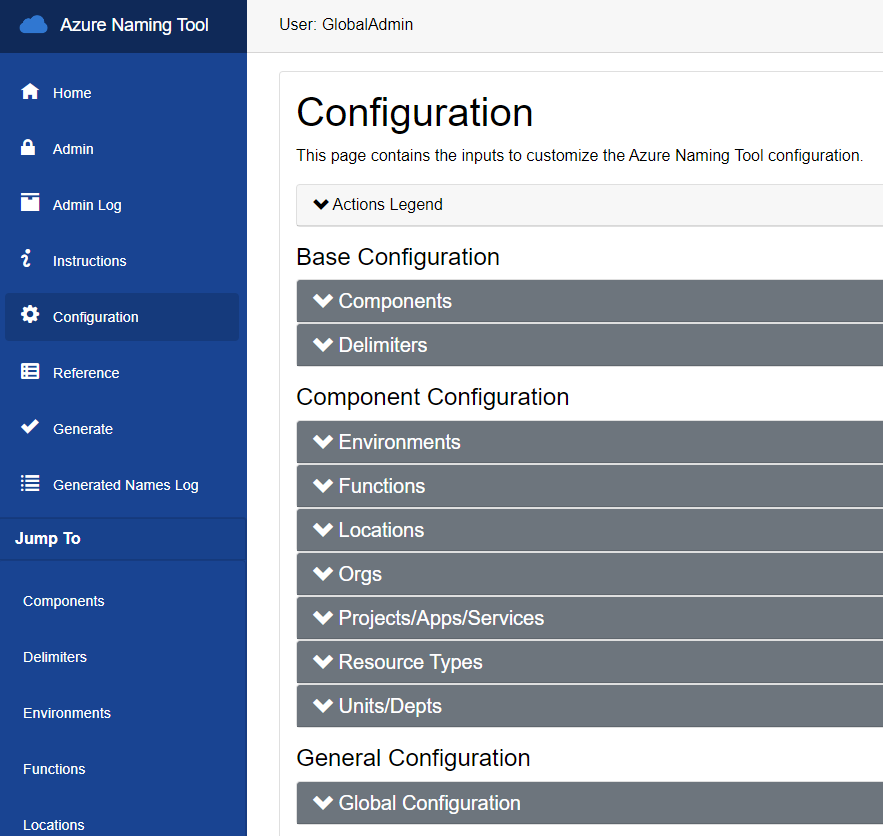Azure Naming Tool
 Fabrice Carrel
Fabrice Carrel
Here's a very useful and official Microsoft tool to help you manage the nomenclature of all your Azure elements.
Microsoft patterns & practices : https://github.com/mspnp/AzureNamingTool
The Azure Naming Tool was created to help administrators define and manage their naming conventions, while providing a simple interface for users to generate a compliant name. The tool was developed using a naming pattern based on Microsoft's best practices. Once an administrator has defined the organizational components, users can use the tool to generate a name for the desired Azure resource.
Below is a quick guide to run and use a local Docker version of the tool for testing purpose
- Get the source code
wget https://github.com/mspnp/AzureNamingTool/archive/refs/tags/v4.2.1.tar.gz
tar -xvf v4.2.1.tar.gz
cd AzureNamingTool-4.2.1/src/
- Build the image
docker build -t azurenamingtool .
- Start the container
docker run -d -p 8081:80 --mount source=azurenamingtoolvol,target=/app/settings azurenamingtool:latest
Log in to the UI and set the default admin password : http://localhost:8081/
Go to the Configuration page and set the Component

Generate a name for a resource, below an example for a PrivateDNSZone virtualNetworkLins

Build image and deploy via ArgoCD
Push your builded image to a registry
docker build -t contoso/azurenamingtool:v4.2.1 .
docker push contoso/azurenamingtool:v4.2.1
Now that your image is accessible from a registry, add the registry to your ArgoCD server.
Below is a sample of deployment code to deploy the app using your image (you can either apply the yaml via kubectl or as a project on ArgoCD).
This deployment will deploy the app with a PV, a service and an Ingress.
apiVersion: apps/v1
kind: Deployment
metadata:
name: azurenamingtool-deployment
spec:
replicas: 1
selector:
matchLabels:
app: azurenamingtool
template:
metadata:
labels:
app: azurenamingtool
spec:
containers:
- name: azurenamingtool
image: contoso/azurenamingtool:v4.2.1
ports:
- containerPort: 80
volumeMounts:
- mountPath: /app/settings
name: settings-volume
volumes:
- name: settings-volume
persistentVolumeClaim:
claimName: azurenamingtool-pvc
---
apiVersion: v1
kind: PersistentVolumeClaim
metadata:
name: azurenamingtool-pvc
spec:
#Specify a storageClassName or leave blank to use default one
#storageClassName: longhorn
accessModes:
- ReadWriteOnce
resources:
requests:
storage: 1Gi
---
apiVersion: v1
kind: Service
metadata:
name: azurenamingtool-service
spec:
type: ClusterIP # Service type for Ingress
ports:
- port: 80
targetPort: 80
selector:
app: azurenamingtool
---
apiVersion: networking.k8s.io/v1
kind: Ingress
metadata:
name: azurenamingtool-ingress
annotations:
nginx.ingress.kubernetes.io/rewrite-target: /
spec:
rules:
# Specify the URL you want the app to be accessible
- host: azurenamingtool.contoso.domain.lan
http:
paths:
- path: /
pathType: Prefix
backend:
service:
name: azurenamingtool-service
port:
number: 80
Subscribe to my newsletter
Read articles from Fabrice Carrel directly inside your inbox. Subscribe to the newsletter, and don't miss out.
Written by
